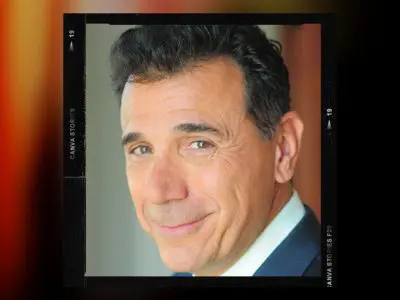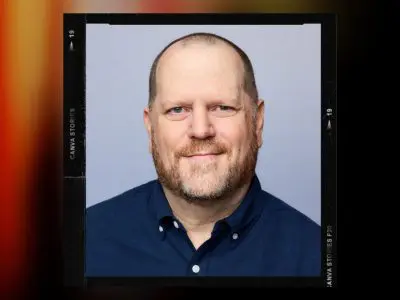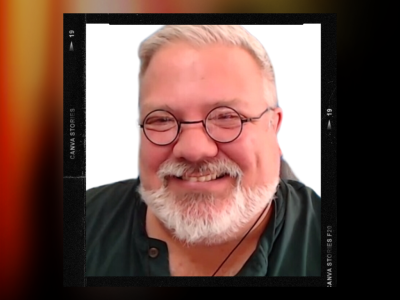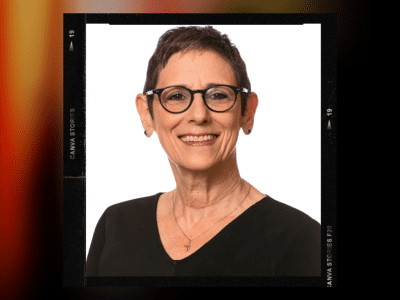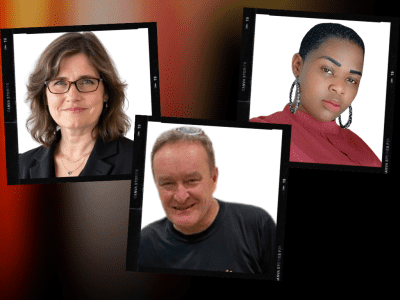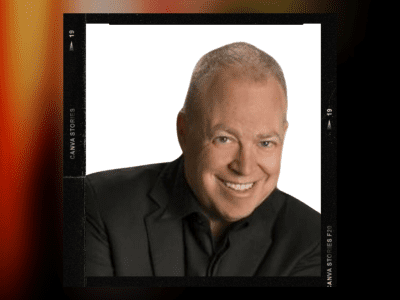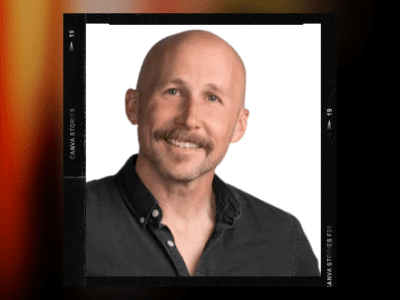Inclusive Leadership 101
w/ Ash Beckham
Use the buttons above to listen now.
Transcript - Inclusive Leadership 101
Host, Rich: On this episode of Team Building Saves the World.
Guest, Ash Beckham: Everybody has to have, has to feel empowered to be able to be a true version of themselves, right? No matter who you are, no matter what you’re doing, whether you’re in the Fortune 100 C-suite, or you’re the benchwarmer on the sixth grade basketball team, you can lead from exactly where you are.
I’m not going to be that. I would love to be six foot, but it’s never going to happen, right?
Host, Rich: Yeah, I was going to say thank you, but I’m only five nine.
Guest, Ash Beckham: Exactly, the same book.
Host, Rich: Hello team. It’s me, your old friend, Rich Rininnsland, host of Team Building Saves the World, the show where I speak to thought leaders from around the world, discussing variable strategies and tools to help you and your team build a better work environment. And today we’re going to talk about your right to equality in the workplace with noted speaker, equality advocate and author of step up how to live with courage and become an everyday leader, Ash Beckham.
But first I do have to share some love with all of my support at TeamBonding. If your team is ready to experience teamwork through the power of play, the visit TeamBonding.com to learn more now, team. I’m so excited. Please join me in welcoming my guest advocate, author and viral sensation. Since the release of her TEDx talk “Coming Out of Your Closet,” Ash Beckham, Ash, good morning.
How are you, my friend? Thank you so much for coming on.
Guest, Ash Beckham: I’m great, Rich. So excited to be here. Thanks so much for having me.
Host, Rich: Oh, thank you. Seriously. Let’s start off, if we can, the way I normally do with guests, uh, just to introduce them to my team out there. Tell them a little bit about yourself and how this course became your life’s work.
Guest, Ash Beckham: Yeah, it was kind of, um, like all of us, right. You kind of like, find your calling by accident by tripping into it. Right. I was, um, I was doing a bunch of different things in life, trying to kind of make my way and was, um, you know, out in, in my little community, but not uh, an advocate, I would say, certainly not an activist.
Then, um, then realized that, you know, I dunno, I just wasn’t a jump up on the soapbox with the picket sign kind of marching gal that kind of wasn’t my, wasn’t my, my way, but also knew that there needed to be changed. Right. And so, um, it just kind of happened by having conversations and started doing a little bit of public speaking here and there and, um, got some traction online and, um, cause it’s kind of off on my way.
And then that went from, you know, kind of straight up diversity equity work, to more of the inclusion belonging leadership work. Um, as I went along the path and, and now it’s kind of, uh, you know, you can’t put the toothpaste back in the tube as they say, so that is, that is the path that I’m on and I’m, I have so much gratitude for it and I’ve met amazing people and, and love, love what you guys are doing and it feels like it’s such a, such a great fit. I’m excited for the conversation.
Host, Rich: Fantastic, thanks. So let’s talk about equity. Let’s talk about equality. Let’s talk about all of this. Um, Why, first off, do you feel, uh, in your own words that it’s important in the workplace in order to have that equality?
Guest, Ash Beckham: Yeah, absolutely, because I think any of us that are in anything that involves a team, um, and certainly in the workplace, but that happens in our communities, on our athletic teams, on our PTOs, right?
If you have a team, you thrive when you’re getting the best from everyone.
Host, Rich:Right.
Guest, Ash Beckham: Right. And everybody has to have, has to feel empowered to be able to be a true version of themselves, right? Not necessarily what you want, an authentic version of yourself. And if they don’t feel equity, if they don’t feel inclusion, if they don’t feel valued for who they are, not in spite of who they are, you’re not going to get their best.
And just like purely on a numbers game, you’re, you’re losing efficiency. Right. If I have to think about whether or not I can tell you I’m married to a woman. If I have to think about whether I have to tell you that I’m taking care of my older parents. The challenges that I face based on my race or my religion. If I have to tell you the challenges. If I, if I have to think about whether or not I can share those challenges with you.
That is money that is not going towards what we’re all rowing in the same boat for, right? So I think that on a numbers perspective, so, you can kind of hit it two ways, right? You can hit the head or you can hit the heart. You can hit the head. You want, you want people to be efficient and we’re losing efficiency.We’re losing work hours when people are covering for who they are, right? When they can’t trust when they can’t fully show up. And then on, you know, on the more heart end of it. We want people to feel like they belong, right? We don’t want it to just be a job. None of us are in this just for the job piece, right?
If we’re interested enough in team building to be listening to the two of us speak, right?
Host, Rich: Exactly.
Guest, Ash Beckham: We’re motivated to do that and our hearts are in it too. So we want people to feel that. And when they feel like they belong, they trust, they lean in, they’re willing to go the extra mile, right? All the things that we want from our team.
Host, Rich: I like to think that it’s also that we’re both so remarkably charming that they just..
Guest, Ash Beckham: Oh obviously, yeah, for sure.
Host, Rich: Good, good, good. Okay. So let’s talk about what you’ve seen so far in the workplace. I mean, people, of course, calling you, hiring you to either talk or to, you know, have, have lectures or what have you for these people, what kind of things are you seeing right now that are, either still in need of being fixed or you were seeing that repair happening.
Guest, Ash Beckham: Yeah, absolutely. I mean, I think it kind of depends on the organization. A lot of times that is industry specific, right. In where they land relative to that. I think everybody knows it’s important. Everybody knows it exists. I think where we’re at right now is in that process.
Is it just something you have on paper? Is it just in the employee manual or is it something that’s actually in practice? That’s kind of the biggest one. And, and that’s was, to a certain extent, part of the impetus of the book, right? I would go in and I would talk to these organizations, whether it was at a conference or a specific organization on things like team building, how to create a more efficient teams, more authentic communication, things like that. And people would come to me afterwards and say, Ash, you know, it’s so great, I love what you said when I dot, dot, dot, I’m going to implement that. Right. When I have this main direct reports, when I have this job title, when I get this degree, there was always like something to achieve, to be a leader.
In that way. And that was kind of the point of the everyday leadership book: no matter who you are, no matter what you’re doing, whether you’re in the fortune 100 C- suite or you’re the benchwarmer on the sixth grade basketball team, you can lead from exactly where you are. Right.
Host, Rich: Nice
Guest, Ash Beckham: And so how do we empower people that they have all everything they need?
It’s a practice. It’s something you get better at, but you have everything you need to be a leader. And it isn’t the way that we always see leaders portrayed, right? It’s not like the, you know, over six foot straight white guy who’s good looking in the, you know, that’s what we see a lot. But at the same time, like all of us can lead.
But. I’m not gonna be that. I would love to be six foot, but it’s never gonna happen, right?
Host, Rich: Yeah, I was gonna say thank you, but I’m only five nine.
Guest, Ash Beckham: Exactly. So we, when we, when we, when we go that direction, we have to see that these skills are not just, you’re, you’re not like ordained a leader, right? There’s things that we develop, things we can work on, things that are already our strengths and things that we can pursue because that, you know, there’s these eight components of leadership and however you look at it, you know, they say, every time, if all you have is a hammer, everything looks like a nail.
And the point of this book was, different situations require a different set of skills to be the leader that you want to be. And if we know all of these skills, then we can decide, I need a little bit more humility. Oh, I need a little bit more courage in this one. Need a little bit more individuality. We can kind of select what’s going to fit the situation best.
So that that was, you know, all of that. All the speaking that I was doing and conversations I was having, that’s what I felt was most needed, was empowerment for everybody at every level.
Host, Rich: Speaking of these eight pillars of yours, uh, from the book “Step Up,” which do you think people are mostly struggling with nowadays?
What are you, what are you seeing that, you know, because I don’t want you to have to, I want people to go buy the book for you, Ash.
Guest, Ash Beckham: Sure, yeah, yeah, yeah, yeah, don’t want to give it all away
Host, Rich: Yeah. Don’t give away the candy store, but let’s talk about the ones you’re seeing right now, especially in this day and age, the way that the market is now.
Guest, Ash Beckham: Yeah, absolutely. I mean, I feel like authenticity is the hardest thing to do because I think on so many levels it go. And for me, everything, there’s two sides to every coin, right? I think that people are going to workplace. You go in, especially. You’re going in somewhere new and can I fully be myself? Is this place safe?
If I have a diversity of any kind, seen unseen, not kind of the traditional diversities, but I have different work requirements, right? I have different healthcare requirements. I have all these different things that I need. Am I going to be valued as somebody that contribute again because of that, not in spite of that, that at the same time, I think the other side of the coin is, you know, I feel like diversity, equity and inclusion is a really tough spot right now, right?
Like it’s been politicized as it, as it need not be.
Host, Rich:Yeah
Guest, Ash Beckham: And at the same time, We’ve created a cancel culture where you, you can have the best intentions, but you say the wrong thing or you slip. And I think that there’s a fear that that is potentially ruining your career.
Host, Rich:Right. Right.
Guest, Ash Beckham: And so we don’t really, so I guess it would be authenticity, but then what’s coupled with that is grace, grace for ourselves as people that are growing and learning and moving through this process, because you know, what diversity looks like.
Five years ago is different than what it looked like 50 years ago. And how are we constantly changing? Right. It’s nothing that we’re ever going to figure out, but at the same time, how do we give people the grace that are going through that, that one missed? Like if somebody is trying and they mess it up, how do we, how do we be allies to people that are aspiring allies?
Right. How do we step in and fill that void? And it isn’t a pass fail, right? It’s an evolution for all of us. How can we be just a little bit more gentle in that way too?
Host, Rich: How do we do that, though? Like, what are some steps we can take? Because the hardest thing in the world would have to be trying to explain to somebody why I should be allowed to tell you who I am.
Guest, Ash Beckham: Right. Absolutely. I think that we, you know, you take that same, I think it has to be organizational, right? It has to be honored by the organization, but it has to happen at all levels. It takes the braveness and the vulnerability of our leaders to be able to step in and say, ‘Hey, I’m, I’m constantly going to check in.’
We know one of the things that we always want to do is think about who we could be leaving behind. Like it isn’t the responsibility of people that are, you know, identify with a certain diversity to rectify those changes, you know, to go and say, well, this is the non inclusive language that you’re using.
We need allies to do that because when allies are doing it, there’s a more, altruistic, approach. Lends to it, right? It’s an evolution that we’re doing collectively when it’s me advocating for myself individually, that seems much more self serving, right? And you’re much less likely potentially to be able to accept that as opposed to, we collectively are moving forward and so we are not going to use gender specific language in any of our marketing. Right. Like we’ve moved beyond that. It’s an evolution when we’re coming to it collectively. And that’s just impossible to do without allies.
Host, Rich: And I loved one of the things that I heard you talking about in one of your TEDx is I can’t remember the title of it, but it’s the one where you talk about taking your niece to go see Ana and Elsa.
Guest, Ash Beckham:Oh yeah, yeah, yeah, absolutely.
Host, Rich: Guys, uh, my team out there, if you ever get a chance, please go find Ash and her TEDx talks. They are not only. Humorous, but also very meaningful. But you talked about the duality of the self, how you can be both an aunt to this child and an advocate at the same time. How do we, how do we teach people that they can be that for themselves and then therefore teach others that they can be that, you know, we can make this all spread down the line.
Guest, Ash Beckham: Yeah. I think just, I mean, I think the first step is to see ourselves as multidimensional, right? That we are never just one thing. Like I have. My hat that I put on, but it’s impossible for me to have this conversation with you and not know that my kid’s upstairs and he was sick last night and coughed all night long, right?
Like I don’t, it is a small portion of my brain, but to say that there’s not 5 percent of my ear that’s listening to make sure.
Host, Rich: Sure, Sure
Guest, Ash Beckham: He’s okay. And just, uh, friends, my wife’s upstairs. I left my six, six year old upstairs, but still like, there’s the part up there, you know, just wanting to hear him running because then I know he’s feeling better. Right?
Host, Rich: Yeah, Yeah
Guest, Ash Beckham: That I am both of those things at the same time. I am no less engaged in this conversation. Right. I’m also a small business owner. I also have an aging parent, right? Like I am multi dimensional in all of the things I can feel going into any project, right? I can feel excited to do this podcast and I can feel a little bit of anxiety at the same time.
They’re not mutually exclusive, right? My emotions, my existence, my roles, all the things that I do are not mutually exclusive. It is this mosaic of who I am. We have to be able to see our coworkers and our team members in that same way that they are not just a singular entity, a singular emotion. They’re not. You know, a job title or it’s not transactional.
Right? That it is more layered than that. So we have to first acknowledge it in ourselves. And that I can bring those pieces that I can say to you in this conversation. Hey, you know, I’m a, I’m a little bit distracted today because I’ve got a sick kiddo,
Host, Rich: Yeah
Guest, Ash Beckham: Right? Or the fundraiser is happening or the church that is, you know what I mean? That’s like, we have all of these things and I don’t have to tell you everything to tell you enough. Right. I don’t have to like, divulge all of my deepest, darkest secrets to give you enough to show you my humanity, right? That those are completely different things.
And that’s, you know, authenticity and transparency are different in that way.
Host, Rich: Well, we’re going to get to your deepest, darkest secrets a little later in the show.
Guest, Ash Beckham: Oh, absolutely. I got plenty of time. I’m wide open.
Host, Rich: Ash, this is fantastic, but I hope you don’t mind real quick. I just need to step away because of course I have to tell all my team out there about the company.
I am very proud to be a part of TeamBonding. TeamBonding was founded over 20 years ago with one simple question. How can employees have a great time while fostering strong, authentic bonds between people who work together, no matter where your company is located. TeamBonding offers powerful, engaging, custom team building events designed to get the best out of your team anywhere in the world.
They’ve created a catalog of innovative events using the power of play as a learning tool and tapping into the correlation of work and play. So whether it’s scavenger hunts to jeopardy or so many more, the TeamBonding of activities, whether they’re live, virtual or hybrid, maximize the impact of team building with an accent on fun.
So visit TeamBonding.com to schedule your event. Now TeamBonding when you want seriously fun results.
And speaking of seriously fun, we’re continuing the seriously fun conversation with Ash Beckham. Ash, let’s look at it from another direction, if you don’t mind. What can companies do now? To actually help implement the things you’ve been talking about.
Guest, Ash Beckham: Yeah, absolutely. I think, you know, in any organization, what gets measured gets changed. So how are we incorporating in diversity, equity, and inclusion initiatives, or however, it’s framed within your organization. A lot of people have moved, you know, DEI is kind of become a little bit of a lightning rod. So now it’s just belonging, right?
This cultural sense of belonging. How is that incorporated into not only like team, uh, planning, individual reviews, right? Like, how is that a component of something we’re actually measuring? And it’s less, you know, it doesn’t, doesn’t necessarily land on an Excel sheet, but there, and we can be moving in the right direction, right?
That we’re trending in the way of trying and whatever that looks to us, like to us individually, right? Right. How can we individually set those goals to be able to do that? And then be held accountable for things like that.
Host, Rich: And, but how can they still do that? And. Because you’re, you’re, it’s the way of the world, especially God forbid, right now, where, when you have one point, someone is going to be yelling the counterpoint.
Guest, Ash Beckham: Yeah, absolutely. Because I think what we’re, the biggest part, the biggest reason we are having the conversation of diversity, equity, inclusion, again, on that numbers line is because diverse teams perform better. They’re better at problem solving. They’re better at recruitment and retention. They outperform their industry median.
The numbers are there, the diversity, but it’s not. You know, just because correlation is not causation, just because you have the numbers. It’s not a recipe, right? You’re like, I have six of these and three of these and two of those, right? Like it isn’t that. Those people have to feel like they can bring that perspective.
My go to example is like, you don’t want me if you’re running an ad agency and you just landed the Subaru account, you don’t want me because I’m a lesbian. Right? Like I might have insights to sell in Subarus to a specific demographic that outperforms in that purchase year over year, right? You want me because the path that I have taken to get to this spot in my life has been different than other people on a team.
Therefore, I have different insights. One of my favorite examples is there was this team activity where you had one team that was very homogeneous and they had to put together and the teams had to put together their recipe that required ketchup, right?
Host, Rich: Okay.
Guest, Ash Beckham: Okay. And one team was very, uh, um, homogeneous, and one was ethnically diverse, um, and international, right?
And so they’re doing it, they look in the catch they look in the, um, refrigerator, there’s no ketchup. And so they try to come up with something that would be a, um, substitute for ketchup. The other team, international, looks in the cabinet. Because where they’re from, they keep the ketchup in the cabinet, right?
And the ketchup there, you can’t problem solve in that same way because you don’t have the historical knowledge. Like I don’t want a bunch of mini me’s. So if we, if we say that’s a premise, right, that we are going to recruit and attain better, we’re going to have better results. We’re going to be more productive.
We’re going to problem solve better. We’re going to be more creative and innovative. If we accept that premise, which I know that’s saying something, but the numbers are there to prove that. Then we have to figure out how to get along with people that are different than we are. We have to be able to respectfully disagree.
We have to be able to be able to be authentic. And that is complicated. I don’t want a team with no conflict.
Host, Rich: Right.
Guest, Ash Beckham: Right. I just need a team that can, in a healthy way, resolve conflict.
Host, Rich: Yeah.
Guest, Ash Beckham: Right. And so that’s what it is. So I think you have people, my, my response to that would be why hopefully no one’s screaming.
From either side, right, that we’re have, that we know what we’re doing. And that doesn’t, and I don’t, you don’t need to have everybody on your team, doesn’t have to be a friend? It’s a completely different dynamic, but everybody has to feel like they belong. And that is our collective responsibility, not the leader’s responsibility.Everybody’s responsibility.
So we then constantly have a conversation of who doesn’t feel like they do, who feels like they don’t belong, right? Who are we forgetting? Who are we leaving behind? And what can we do to change that? I feel like the hybrid work environment is a perfect example of that. Right?
Host, Rich: How so?
Guest, Ash Beckham: We have some people that are in person, some people that are, you know, remote, that is challenging, right? That, that is, you know, in a nontraditional sense, but a diversity and how do we make people feel like they belong in that environment where they’re, where they could feel isolated, right? That is, that takes work.
It takes intention. You have to be mindful of the fact that if you have somebody on zoom and they haven’t talked for 10 minutes, maybe you muted them by accident, right? Like you have to be mindful of what’s happening and how that plays into it. It doesn’t take a tremendous amount of effort, but you have to be aware. And ignoring that Diversities of any kind exist and everybody’s the same. And it’s just, you know, equality, not equity is a huge mistake.
Host, Rich: So what’s the secret? I mean, have you figured it out? Has anybody made the work?
Guest, Ash Beckham: Yeah. You know, I think there are some organizations that do it. I think, um, One of my favorite ones is Bank of America. They have a series called hard conversations and they have people who come up, you know, and they’ll get people from varying levels within the organization.
But when there are these supercharged political issues, they will have two people from differing opinions, maybe different backgrounds, and then maybe, um, people that are, you know, somebody who’s hyper aware and focused on something, somebody who isn’t, you know, and, and they have them have that hard conversation.
And in front, you know, we virtually usually, but excessively virtually for people to be able to say, okay, like, this is how we talk about it. This is how this is the example that we will make of how to have a hard conversation and it’s not easy. Again, you like need the support. It’s simple, but it’s not easy.
You need the support around that. So I think that that’s part of it. I think having, um I think other organizations have done like the evolution of the employee resource group, you know, I think those used to kind of, they started a lot of time ago as support groups, you know, of like people that were like me when I wasn’t like anybody else in the room.
And now they’ve really become more educational because now I think if you have like the, um, LGBTQ employee resource group, like, yes, if you have people that identify as, um, somewhere in the LGBTQ spectrum or allies, that’s one thing, but you could also have somebody who’s kid just came out to them as trans and you are the best, you, the organization has the best resources possible for somebody to be able to help.
So what, you know, the blend, the blend between personal and professional, I think has never been, has never been so evident.
Host, Rich: Seriously. Yeah, very much. So, I mean, you’re, you’re talking about in a corporate sense now, and honestly, I’m flashing back to conversations I’ve had with my own family. In recent years, because God knows we, we all, even though we came up in the same background are different people.
With different wants, different needs, different insights, but it’s so easy to be triggered by everything nowadays too. I mean, don’t you think most employers out there just want people to shut up and do their job anymore?
Guest, Ash Beckham: Absolutely. Yeah, no, for sure. I mean, I think that would, that would be ideal, but is that getting to them and how do we learn as the team again on the team? It can vary from team to team what people feel comfortable talking about, right? Like you, again, like none of this should be forced. It doesn’t have to be, but where do we as a team collectively land on? Like, we’re just not going to talk about politics.
Okay. But if you’re a government contractor. Right. Or, or it’s going to significantly impact your workflow. You have to be able to have a conversation about what a changing administration is going to do.
Host, Rich: Yeah.
Guest, Ash Beckham: If it doesn’t affect social policy, fine. If you’re in healthcare, maybe it affects, you know what I mean?
It just, those, it gets really blended and how do we have parameters? And also I think part of it is you could have opt-ins where people talk about it, right? We could have a Zoom lunch. We can have something like that. Like if we want to talk to anybody that’s interested, we’ll kind of get together and have that conversation.
We can vent, but in these other team meetings, when we’re with a client, these are the parameters we’re going to stay within. We’re constantly reevaluating and adjusting because the way that today’s society works, we’re constantly pivoting because new things are always happening. Right. But I feel like when that happens, we just all need to know what are. Cause if there’s no parameters, if we don’t set any of those boundaries, then it can go everywhere. Right?
And that’s, I think when people get triggered so much more, this is what feels safe, this is where we’re going to be. And then we just need to know if we need to make it bigger or smaller, but we kind of start having that conversation and we collectively decide, obviously with some guidance on. What HR would want and what kind of our bigger limitations are, right? But like how do we decide what our playing field is gonna be on our team?
Host, Rich: So how do you help an individual? Because You’re gonna be reaching a remarkably wide audience just with your TEDx talks alone ,how can you, what would you give as a recommendation to just an individual? To help them start on their own process.
Guest, Ash Beckham: Well, I think the first thing is realizing the leader that they want to be. Right. And I think that when we move in this direction, right, the biggest piece is empathy. The biggest thing we can possibly do is understand that people that see, see things differently, whether it’s a political point of view or anything else, it isn’t, if they’re on our team, we have to start with the, we have to start with the perception that they’re not stupid.
And they’re not jerks, right? Of our baseline. And I mean, I think any of us, I mean, you have people out of the same, might have some jerks on their team, but like generally speaking, that comes from somewhere.
Host, Rich: Okay.
Guest, Ash Beckham: And so how do we get curious as to where that comes from? How, how are we, you know, what, what is that viewpoint about?
Why are you such a, uh, stickler on A, B, and C? Right? Like, it comes from, there’s a reason that you did, people don’t just like arbitrarily have stances, I don’t think, right? Like, there is a history there, and I can understand you better if I know why you voted that way. I know why you voted that way. I know why you decided to be hybrid, or I know why you want to be in the office five days a week.
Like if I know more about, there’s a why behind everything, right? So if I know more about you, then it humanizes you a little bit and it makes you a little bit less of a villain. And it makes you seem, and I have an understanding that you are intentional and you’re not arbitrary and you are thoughtful. It’s just different than the process that I had.
Right. So I think empathy is the first step. I think that we can like, you know, dip our toe into some of these conversations a little bit. You know, I can create a space where, you know, my cube, my zoom screen, whatever it is, is a safe space to have respectful conversations. Again, um, It doesn’t mean that I have to be friends with everybody.
I don’t have to agree with everybody. That’s the best thing about empathy, right? I don’t have to agree with someone to be empathetic. Sympathy is a little bit different, right? Like I just have to be willing as somebody who’s been empathetic to, to remove myself from my kind of knowledge set and step of my foot in those shoes to see where they are and how they got there.
And if I don’t have to agree with them, There’s really nobody you can’t be empathetic for, right? We have a baseline of respect. We have a baseline, you know, there’s like certain things that are the parameters, but generally speaking, I can kind of get there with anybody. So I think to just get curious is kind of that first step.
And then to create a space of people and whether, whether those are people at work, you know, you kind of, you, you come up with your people, you can have those conversations where, Hey, I might not say this, right. I’m thinking about going to my boss and saying something. How do you think this lands right? I, my, my bosses, you know, seems to be defaulting to always going to this one teammate, team member and not anybody else.
And that feels challenging. And I want to kind of call them out on it, but like, how do I frame that? From an I, instead of a you, kind of accusatory, right? Like, how do you have your people that you can truly have these like practice conversations with not to gossip, not to have like a side story. Right. To truly gain the knowledge and the practice and the resolve to be able to have those hard conversations.
And then we have them in these like little, we make ourselves just a little bit uncomfortable every day. And then our resilience builds.
Host, Rich: Okay. A lot of this. Sounds like it’s going to take a lot of work for people, uh, even just for individuals because they’re always going to come across those people that are just going to be rams headbutting against them.
Where do we find that courage to continue after we feel like we’ve been beaten down enough?
Guest, Ash Beckham: Yeah, absolutely. I think that it’s those, those small steps, right? That you can’t, you know, you’re always moving up into the right. That’s what we’re always trying to do is move up into the right. But if you zoom in on this journey, it’s going to be up and down and up and down and up and down and up and down, right?
Host, Rich: Yeah, Yeah
Guest, Ash Beckham: Like that’s, that’s what it’s got to look like. And we have, that’s where the grace piece comes in. Is we have to know, you don’t have to fight every fight.
Host, Rich: Sure.
Guest, Ash Beckham: You’re no less of an activist, no less of an advocate, no less of an ally. If you let one slide every now and then, honestly, cause we’re just, you get really tired and that’s okay.
It’s okay. Give yourself a break to do that. And also we spend so much time. It’s like you have the one like uncle in your family who is adamantly against the things that you believe in, right? And you get sucked into just banging your head, like you ram your head against the wall, just like you said. Well, there’s dozens of other people in the family to talk to, right?
Like, I don’t have to change someone’s mind to be on this journey. Like, sometimes you just kind of let them go. You just kind of agree to disagree and you move on and you’re much more efficient. Being authentic in other spaces, because you’re not going to do it where you don’t feel safe, right? So you find those little pockets, you find a couple of those people that you can be authentic with and you don’t waste your time on the people you still engage.
You still kind of use your practice, but changing someone, changing a single person’s mind, getting stuck on that. And that is, is just gonna, I mean, that treadmill, you’re never going to win.
Host, Rich: Yeah.Yeah.
Guest, Ash Beckham: Right. So you just gotta let that one go. You can go back to it. You can do whatever, but you, you find these little pockets because I think when we practice authenticity and we start to have these harder conversations, when we’re, we have these open and honest things, when we, we push our comfort zone, whether that’s, you know, With a brain, you know, for some people that’s like sending back the wrong coffee at the coffee shop, right?
Like there’s little things like, ah, that’s too hard. I don’t want to do it. It makes me feel uncomfortable. Right. When we, when we push that in whatever way we need to, the positive reinforcement cycle is tremendous. We just need to start doing it. And then the, the one person where we’re banging our head against the wall doesn’t seem as impactful.
Host, Rich: Wonderful. Fantastic. Ash, I, I can’t believe 30 minutes has already gone by. I’ll be honest with you. This has been a fantastic conversation. I can’t thank you enough for coming on. Uh, before we do move on, is there anywhere, like if my team wants to learn more about you and especially like to find your book, where can they go?
Guest, Ash Beckham: Yeah, absolutely. The book is it all, um, you know, online at, um, all the natural places. If you want to do an independent bookseller, if you go through, um, my website, that’s an independent bookseller that way. Either way you want to do it. So it’s AshBeckham.com And then I’m on all the socials @ashbeckham on Instagram.
I was a little late to the party, so it’s at the AshBeckham.com Um, but, uh, yeah, I would love to connect with anybody. All the contact forms are there and love having this conversation.
Host, Rich: Fabulous. Thanks again. And I hope you continue. To enjoy yourself because it’s time for my speed round.
All right. Just explain to you what this is again, Ash. Uh, I’m going to start playing some music. That means it’s going to last about 60 seconds. Just keeps me in mind of where we are in the timing during that 60 seconds. I’m going to ask you a series of questions. They are completely innocuous, simple questions.
The objective is for you to answer as many as you can within that 60 seconds. So we get to know you a little bit better. Okay. But also if you’re feeling at all competitive, uh, we have hit 15 this season, but we’ve, so if you’re feeling up to it, let’s see if we can’t break that today. I like it. All right.
As soon as you hear the music, I will ask the first question and away we go.
What’s your name?
Guest, Ash Beckham: Ash.
Host, Rich: How many kids do you have?
Guest, Ash Beckham: Two.
Host, Rich: Do you have any pets?
Guest, Ash Beckham: I have two cats.
Host, Rich: If your cat, if you could ask your cat a question, get an answer. What would you be?
Guest, Ash Beckham: Why do you keep scratching the couch?
Host, Rich: Which of your two children is your favorite?
Guest, Ash Beckham: Oh, God. Right now, the older one.
Host, Rich: What’s your best childhood memory?
Guest, Ash Beckham: Ooh, I loved learning how to ride a bike
Host, Rich: Favorite holiday?
Guest, Ash Beckham: Oh,Thanksgiving.
Host, Rich: If you could be any cartoon character, which one would you choose to be?
Guest, Ash Beckham: Ooh, uh, bugs Bunny.
Host, Rich: What’s one choice you truly regret?
Guest, Ash Beckham: Oh, God, that’s a long one. Um, oh, I was unfaithful to a previous partner.
Host, Rich: Okay. Uh, favorite book?
Guest, Ash Beckham: Ooh, um, I’m right. Uh, whole brain child right now.
Host, Rich: Favorite ice cream?
Guest, Ash Beckham: Oh, vanilla.
Host, Rich: Where would you like to live except for your own house?
Guest, Ash Beckham: Ooh, uh, by the ocean, Mexico
Host, Rich: 13, my friend, 13. It’s not easy. Well, you can always go back and, you know, watch my other episodes.
Guest, Ash Beckham: That’s right. I’ll get there.
Host, Rich: Oh, thank you again, Ash. I really enjoyed this. You were fantastic. I see now why, you know, you are this becoming the sensation that you were meant to be.
Guest, Ash Beckham: I appreciate it. Rich is such a great conversation. Thanks for making it so easy and for all y’all do.
Host, Rich: Thank you. And thank you, my team out there. That’s it.
We’re wrapping up yet another episode of Team Building Saves the World. If you’ve enjoyed this episode, whether you’re new to the podcast or an old fan of the show, please be sure to share with everyone, you know, whether they’re a coworker or a friend, a family member, it just helps us to share all this vital information, you can find out all about us, including all past episodes.
Team bonding.com/podcast. You can also find this wherever you find your favorite podcasts, Google podcasts, Apple podcasts, Spotify, wherever you go to listen, we will be there. And don’t forget to look for all of us on the social media is aTeamBonding podcast and leave us a message. Tell me whether you like the show, or if you have an idea for future topic for the podcast.
I want to hear from you. So, before we say our farewells for this episode of Team Building Saves the World, please never forget, my friends, if you are within the sound of my voice, you’re on my team now, and I am forever going to be on yours. So long, team. I’ll see you next time.
It’s been said that you learn more about a person in an hour of play than in a year of conversation. So why not put your co workers to play with the help of the team at TeamBonding? TeamBonding was founded over 20 years ago with one simple question. How can employees have a great time while fostering strong, authentic bonds between people who work together?
Their catalog of innovative events include scavenger hunts, Jeopardy, and much more. Each activity, whether live or in a great way to Maximizes the impact of team building with an accent on fun. Visit TeamBonding.com to schedule your event now. Team Bonding, when you want seriously fun results.
November 25, 2024
This week, host Rich sits down with inclusion activist Ash Beckham for a discussion on leadership and inclusion in the workplace. Ash explains the consequences for leaders who don’t prioritize inclusion and authenticity through a business lens and a human lens. The pair discuss inclusive leadership practices, including how to encourage allyship within teams and put inclusive policies into practice rather than just on paper. They emphasize the importance of seeing coworkers as layered individuals rather than just their job title. Join Rich and Ash for expert tips to foster an inclusive culture and genuine employee connections.
About Ash Beckham:
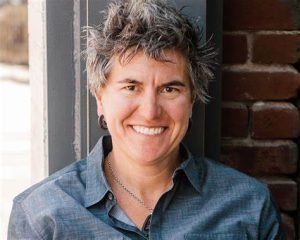
" If you have a team, you thrive when you’re getting the best from everyone. Everybody has to feel empowered to be their true version of themselves. If they don’t feel valued for who they are, then you won’t get their best."- Ash Beckham
Get more human resources and leadership advice.
Less drama? Greater teamwork and job satisfaction? TeamBonding is here to help you build a stronger and happier team. Subscribe to get our team building podcast and thought leadership blogs sent straight to your inbox.







